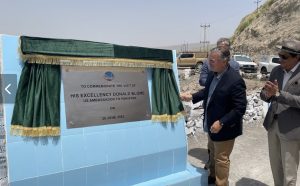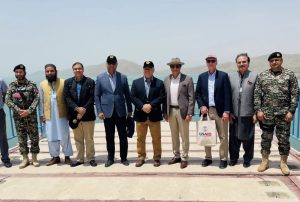U.S. Ambassador Blome’s Visit to Gomal Zam Dam Highlights Economic Accomplishments of Bilateral Partnership

U.S. Ambassador Donald Blome today visited the multi-purpose Gomal Zam Dam in the South Waziristan District of the Newly Merged Districts (NMDs) of Khyber Pakhtunkhwa. He was accompanied by the Chairman of Water and Power Development Authority (WAPDA), Lt. General (retired) Sajjad Ghani, and the Secretary of the Agriculture Department of Khyber Pakhtunkhwa, Muhammad Javed Marwat.

The dam is a joint project of the governments of the United States and Pakistan that has yielded remarkable outcomes. Under the U.S.-Pakistan “Green Alliance” framework, our two countries are working together to advance water management, clean energy, and climate-smart agriculture initiatives. This single project has doubled agricultural production in the region by opening 191,000 additional acres for local farmers. It has also controlled potential flood damage for over 30,000 households, dramatically increased Pakistan’s national water storage capacity, and provided electricity for 20,000 homes.
“We are immensely proud of our $130 million collaboration with the Government of Pakistan on the Gomal Zam Multi-purpose Project, including the dam, irrigation infrastructure, and direct support to surrounding communities,” said Ambassador Blome.
Gomal Zam Dam, the third-largest water storage facility in Pakistan, after the U.S.-funded Tarbela and Mangla Dams, is a critical piece of infrastructure in Pakistan’s strategy for climate change management and overall food security. With the generation of additional 17 megawatts of hydropower, the dam provides a reliable, clean energy source and empowers farmers to improve their socio-economic conditions.
The United States Agency for International Development (USAID) invested $130 million in the dam, irrigation infrastructure, and agriculture development components. The Government of Pakistan and the provincial government of Khyber Pakhtunkhwa provided an equal contribution toward the project cost.
Editor: Raja Kamran